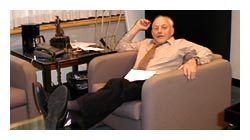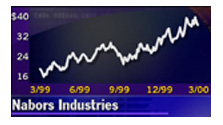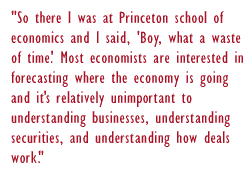NEW YORK (CNNfn) - Fund manager Marty Whitman leaned back in his chair, put his feet up on the coffee table, and recalled with a shrug what many consider their worst day on Wall Street.
It was Oct. 19, 1987, when the Dow Jones industrial average plunged 508 points in its biggest one-day point and percentage loss in history. Whitman didn't realize until the next day that he had lost $1 million.
"I was here working," Whitman said. "I didn't watch it. My sales manager came in the next day and said, 'Marty, you sure know how to lose $1 million.' I said I didn't lose anything."
 If Whitman sounds a little cavalier, it's because he's an old-school value investor who buys stocks cheap for the long term. He could care less what happens day to day. If Whitman sounds a little cavalier, it's because he's an old-school value investor who buys stocks cheap for the long term. He could care less what happens day to day.
And while the rest of Wall Street has been watching the Nasdaq composite fly up and down, Whitman has quietly been building a solid long-term record by choosing his investments through rigorous financial analysis.
"The definition of value investing is being price-conscious," Whitman said. "It's not that you don't participate in growth, you just don't pay for it."
Third Avenue Value Fund, with $1.5 billion in assets, is up 17.5 percent as of March 29. It is one of the top ten small value funds year-to-date as of March 30, and is ranked within the top 13 percent of its category over three months, one year, three years and five years, according to fund-tracker Morningstar.
He is also a co-manager of Third Avenue Small Cap Value Fund and Third Avenue Real Estate Fund, and manages private accounts through Whitman Advisors. In total, he oversees about $2 billion in assets.
He's made a name for himself by finding investment opportunities in financially troubled companies that are in bankruptcy reorganization, earning the nickname "vulture investor."
Tennis player, crusty manager
Whitman, 75, is a gravelly voiced man who isn't afraid to use a curse word to make a point. Sometimes charming, sometimes crusty, he is part doting grandpa, part cutthroat vulture manager and part rumpled college professor who likes to play tennis.
 A teaching fellow at Yale University, he's likely to ask you if you've read one of his books -- "The Aggressive Conservative Investor," and "Value Investing: A Balanced Approach" -- when he talks about the market. His office has a shelf full of photos of his children and grandchildren. One son is a legal historian and a professor at Yale, another son is a classical composer and a professor at Swarthmore, and a daughter works for him at Third Avenue Funds. A teaching fellow at Yale University, he's likely to ask you if you've read one of his books -- "The Aggressive Conservative Investor," and "Value Investing: A Balanced Approach" -- when he talks about the market. His office has a shelf full of photos of his children and grandchildren. One son is a legal historian and a professor at Yale, another son is a classical composer and a professor at Swarthmore, and a daughter works for him at Third Avenue Funds.
A native of Bronx, N.Y., Whitman left to serve in the Navy during World War II -- he didn't see combat -- and returned to graduate from Syracuse University magna cum laude in 1949 with a Bachelor of Science degree. Later, he got a master's in economics at the New School for Social Research. It wasn't until he was in the Ph.D program at Princeton that he decided academia wasn't for him.
"So there I was in the Princeton graduate school of economics and I said, 'Boy what a waste of time,' " Whitman said. "Most economists are interested in forecasting where the economy is going and it's relatively unimportant to understanding businesses, understanding securities, and understanding how deals work."
He worked for a string of investment firms for the next 20 years in New York and Philadelphia before deciding he wanted to get into two areas of corporate finance -- bankruptcy and stockholder litigation.
 In 1984, he took over a closed-end investment company and turned it into an open-end mutual fund. The fund's only holding, oil drilling contractor Anglo Energy, filed for Chapter 11 bankruptcy reorganization "at his urging." Today, the company, now called Nabors Industries (NBR: Research, Estimates), has quadrupled in value in the past year. He is director of Nabors and it is one of his top 25 holdings. In 1984, he took over a closed-end investment company and turned it into an open-end mutual fund. The fund's only holding, oil drilling contractor Anglo Energy, filed for Chapter 11 bankruptcy reorganization "at his urging." Today, the company, now called Nabors Industries (NBR: Research, Estimates), has quadrupled in value in the past year. He is director of Nabors and it is one of his top 25 holdings.
He founded Third Avenue Funds in 1990, concentrating on stocks that trade at 50 percent or less of what they'd be worth as a private company or as a takeover candidate.
Seeking pharmaceutical winners
Lately he's been buying stocks such as Kendle International (KNDL: Research, Estimates) and PAREXEL International (PRXL: Research, Estimates) as a way to get into the long-term growth potential of the pharmaceutical industry.
He also likes insurer Enhance Financial Services Group (EFS: Research, Estimates); Japanese insurer Tokio Marine & Fire (TKIOY: Research, Estimates), which trades as an American Depositary Receipt; and Alamo Group (ALG: Research, Estimates), a maker of agriculture equipment, among others.
"They all have very strong financial positions," Whitman said.
Other holdings that are going through bankruptcy reorganization are Hanbo Steel in South Korea and Innovative Clinical Services (INCL: Research, Estimates), which provides business services for the pharmaceutical and managed-care industries. Whitman said he comes up with plans to help the companies reorganize.
"There's nothing in these restructured companies that isn't confrontational," Whitman said about his bankruptcy work. "You're dealing with creditors, the company, and you're wiping out the common stock most of the time. I'd rather be a lover than a fighter, but it's not such a tough business."
The fund had three bad years -- 1994, when it lost 1.5 percent and was ranked in the 60th percentile; 1996, when it earned 21.9 percent and was in the 62nd percentile; and 1997, when it earned 23.9 percent and fell in the 74th percentile. It earned only 3.9 percent in 1998 but still beat 80 percent of its peers.
 Whitman attributed some of the strong performance to his investment in beaten-down semiconductors when the rest of Wall Street wouldn't touch them. Whitman attributed some of the strong performance to his investment in beaten-down semiconductors when the rest of Wall Street wouldn't touch them.
"I kept writing there is no way the Internet can realize its promise without an explosive increase in demand for increasingly sophisticated computer chips," Whitman said.
In the meantime, Whitman isn't letting the market volatility bother him. He has plenty of time to travel to New Haven, Conn., to teach at Yale two or three times a week, he does a Q&A with investors on his Web site, and he's working on a plan to get one of his books into paperback.
"The way we buy and hold, it's not labor-intensive," he said. 
|

